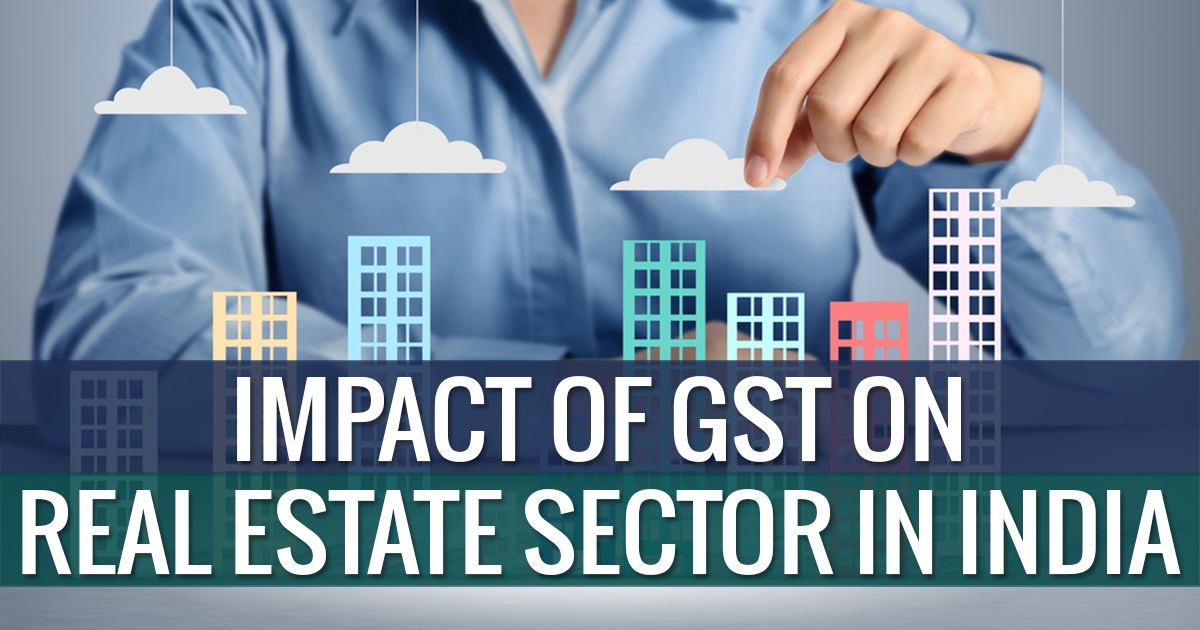
In recent years, the real estate sector has been counted as a major factor in uplifting the economy of the country. Real estate is a vital pillar of economic strength which was surrounded by varied taxes like VAT, service tax, etc. in the earlier tax regime. These charges were paid by buyers willing to invest in residential or commercial projects.
However, the launch of GST (Goods & Service Tax) was done with the motto to reduce the hassles of multiple tax payments/charges levied on all commodities/services with a single tax.
GST is the sole domestic indirect tax that has been in effect since 1st July 2017. This multi-staged tax is applicable on each addition and it subsumes varied taxes like central excise, VAT (value added tax), service tax, entry tax, LBT (local body tax), octroi, etc. which the real estate developers had to pay before implementation of GST. Thus, GST truly ensures cascading of taxes.
In this article, we will discuss everything about the impact and effect of GST in the real estate sector.
➨ Impact of GST on the Real Estate Sector:
1: GST on Residential Project:
GST is applicable on the purchase of under-construction of residential properties like bungalows, apartments, flats, etc. Homebuyers buying such residential properties in India, need to pay a GST rate of 1% (without ITC) in the case of *affordable housing property and 5% (without ITC) for non-affordable housing property.
*In metropolitan cities like Delhi NCR, Mumbai, Kolkata, Bengaluru, Chennai Hyderabad, etc. if the price of the housing unit is ₹45 lakh or below and the carpet area of the unit is 60 sq meter or below, then the housing unit will qualify as an affordable house in any of the metropolitan city. In non-metro cities, price of an affordable housing will be ₹45 lakh or below but the carpet area can be 90 sq meter or below.
No GST is applicable on completed/ready-to-move-in/ready-to-sale properties where the Completion Certificate (CC) is issued on the completion of the construction.
In a nutshell, GST is only applicable on the sale of under-construction properties, wherein the Completion Certificate CC certificate is pending.
2.GST on Commercial Project:
The effective rate of GST payable on the purchase of under-construction commercial properties from a builder involving the transfer of property in land or an undivided share of land to the buyer is charged at 12% with full Input Tax Credit (ITC).
3.GST on Land/Plots:
The sale of land does not attract GST – as per SI no. (5) of Schedule 3 of the Central Goods & Services Act, 2017.
The Central Board of Indirect Taxes and Customs (CBIC) and the GST Council issued a circular stating that no GST will be levied on the sale of land.
4.GST on Renting Services:
If a commercial property is rented out, then GST will be applicable at 18% on the taxable value and rent would be treated as a taxable supply of service. The GST rate of 18% also stands true for vacant property to be used for commercial purposes.
This GST is applicable if the rent amount exceeds Rs. 20 lakhs per year. Even on renting commercial properties, a GST at the rate of 18% is applicable for businesses generating an income of Rs. 40 lakhs or more on an annual basis.
GST is not applicable to residential property that are rented out for residential purposes.The renting of residential property for business purposes is treated as a supply of services by the GST regime. Thus a GST rent of 18% on the residential flats needs to be paid by the landlord on this rental income.
➨ Can Input Tax Credit be Availed?
As stated in point 1, the GST is charged at 1% without ITC on affordable residential properties, whereas the same is charged at 5% without ITC on non-affordable residential properties.
GST payable on the purchase of under-construction residential or commercial properties from a builder involving the transfer of property in land or undivided share of land to the buyer is charged at 12% with full Input Tax Credit (ITC).
➨ GST Applicability after Building Use (BU) Permission
A builder cannot charge GST on the advance amount or on full payment received by him after gaining the CC (completion certificate) of the building.
But, if the builder has received an advance before the receipt of the CC (completion certificate), then GST will be charged on the advance amount as well as on the final payment made by clients.
Wrapping Up:
GST has brought a significant change in the taxation infrastructure. It has been beneficial to the country as well as its people since it has successfully subsumed multiple indirect taxes, thus offering a uniform tax regime to its taxpayers.
Though various changes are being made in the GST rates charged on real estate, post its launch, it continues to be the most ideal change for the betterment of the Indian Economy.
It is difficult to keep a track on the changes made in the taxation criterias of varied sectors including the real estate sector and hence it is advisable to seek expert help.
CTS (Choksi Tax Services) are the best taxation service providers in Ahmedabad. Their expert team can help you manage your taxes in an efficient and cost-friendly way.
